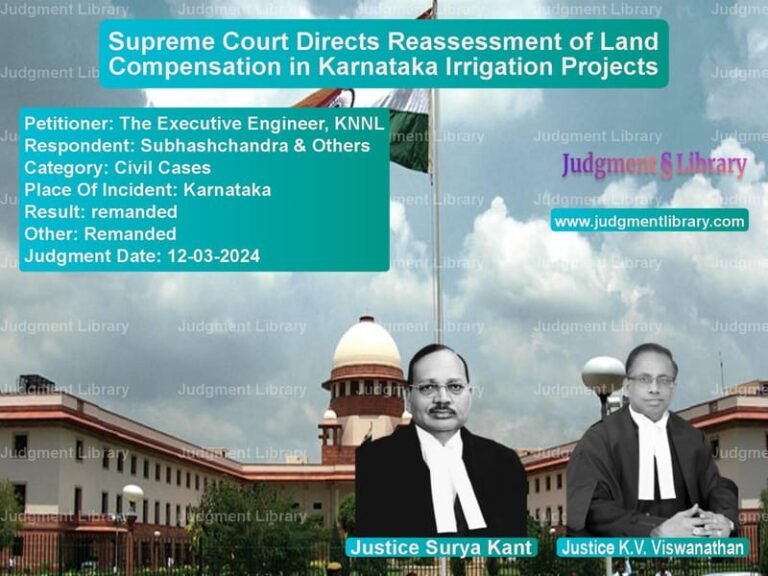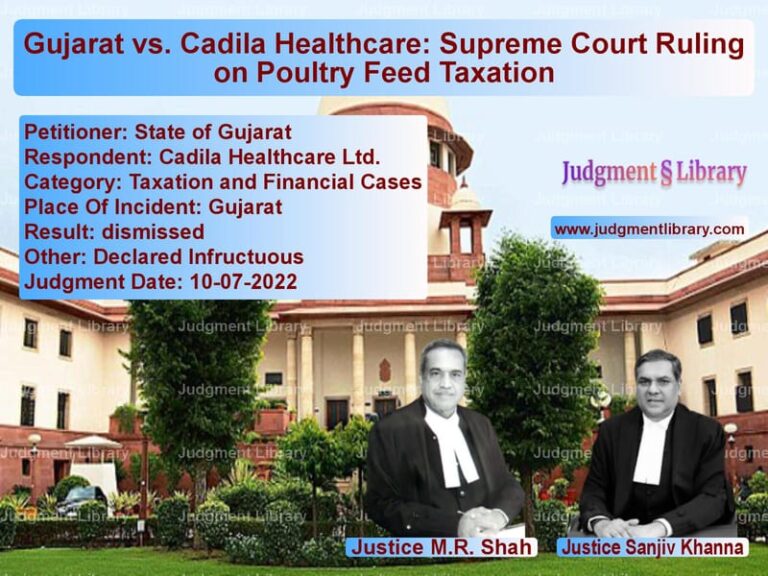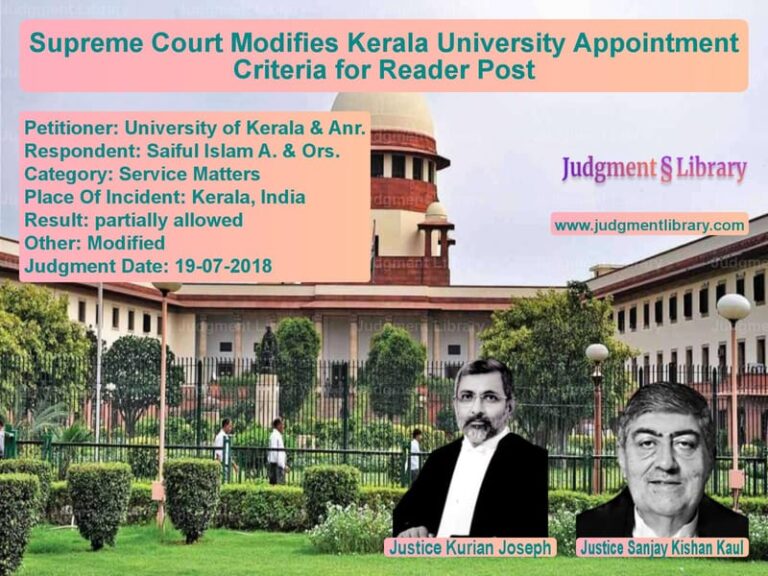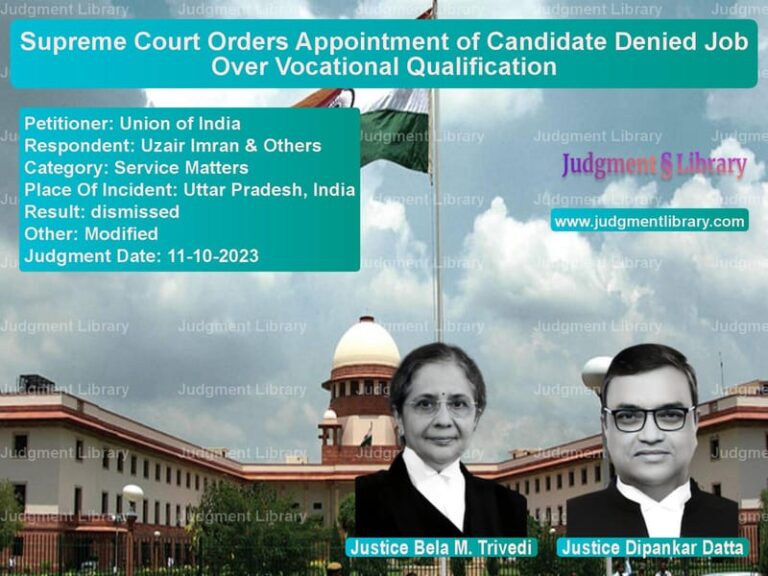Supreme Court Acquits Murder Convict Due to Lack of Credible Evidence
In a landmark judgment, the Supreme Court of India set aside the conviction of Baliraj Singh under Section 302/34 of the Indian Penal Code (IPC), ruling that the prosecution failed to establish his guilt beyond a reasonable doubt. This case, which had been pending since 1992, involved allegations of murder against the appellant and another accused, Baijnath Singh, who had already passed away during the appeal process.
Background of the Case
The case originated from an FIR lodged by Hira Singh Gond (PW-7), who reported that his brother Mangal Singh was killed on January 6, 1992, allegedly by Baliraj Singh and Baijnath Singh. According to the prosecution, the two accused attacked Mangal Singh with lathis (wooden sticks), leading to his death.
The trial court, after examining 13 prosecution witnesses, convicted the accused under Section 302/34 IPC and sentenced them to life imprisonment. Upon appeal, the High Court of Madhya Pradesh upheld the conviction.
Petitioner’s Arguments
The appellant, Baliraj Singh, challenged his conviction before the Supreme Court, arguing:
- The prosecution relied on interested witnesses (family members of the deceased) without independent corroboration.
- The alleged eyewitness testimonies were inconsistent with the medical evidence.
- The weapon used in the crime, as described by witnesses, was different from the fatal weapon identified in the postmortem report.
- The incident stemmed from a long-standing property dispute, making the possibility of false implication likely.
Respondent’s Arguments
The State argued that:
- The testimonies of PWs 8 and 9 (wife and sister-in-law of the deceased) were credible and supported by medical evidence.
- The accused were last seen at the crime scene, and their conduct post-incident was suspicious.
- While minor discrepancies existed, they did not affect the overall credibility of the prosecution’s case.
Supreme Court’s Observations
The Supreme Court carefully examined the evidence and identified several inconsistencies:
- The primary eyewitness, Lakhan Singh (PW-12), initially stated to the police that he saw the accused fleeing the scene but later changed his statement before the court, claiming he saw them attacking the deceased.
- Witnesses Chameli (PW-8) and Ramrati (PW-9) claimed they saw the accused beating Mangal Singh with lathis. However, medical evidence showed that the fatal injury was caused by a sharp-edged weapon, not a lathi.
- The lathi allegedly used in the crime was recovered but was never examined by the forensic team to verify if it had a sharp edge.
- The prosecution failed to establish the presence of independent witnesses, despite the incident occurring in a public place.
Key Supreme Court Rulings
The Supreme Court held:
“It is a settled proposition in criminal jurisprudence that medical evidence, though corroborative, plays a vital role in assessing the veracity of ocular evidence. In this case, the prosecution has failed to bridge the gap between witness testimony and medical findings.”
Further, the Court observed:
“The prosecution’s failure to provide a consistent narrative, coupled with contradictions in eyewitness accounts and medical reports, creates reasonable doubt regarding the appellant’s guilt.”
The Court emphasized that in criminal trials, the burden lies on the prosecution to prove guilt beyond a reasonable doubt, which was not met in this case.
Final Verdict
The Supreme Court set aside the conviction of Baliraj Singh, stating that he could not be held guilty based on unreliable and inconsistent evidence. The Court ordered his immediate release, provided he was not required in any other case.
Implications of the Judgment
This ruling reinforces the principle that:
- Convictions cannot be sustained merely on the basis of interested witnesses without independent corroboration.
- Medical evidence plays a critical role in determining the authenticity of witness statements.
- Every accused is entitled to the presumption of innocence unless proven guilty beyond a reasonable doubt.
Conclusion
The Supreme Court’s decision in Baliraj Singh vs. State of Madhya Pradesh serves as a crucial precedent in criminal jurisprudence. It highlights the necessity of thorough scrutiny of evidence before convicting an accused, ensuring that justice is not only done but seen to be done.
Don’t miss out on the full details! Download the complete judgment in PDF format below and gain valuable insights instantly!
Download Judgment: Baliraj Singh vs State of Madhya Prad Supreme Court of India Judgment Dated 25-04-2017.pdf
Direct Downlaod Judgment: Direct downlaod this Judgment
See all petitions in Bail and Anticipatory Bail
See all petitions in Murder Cases
See all petitions in Fraud and Forgery
See all petitions in Judgment by N.V. Ramana
See all petitions in Judgment by Prafulla C. Pant
See all petitions in allowed
See all petitions in Quashed
See all petitions in supreme court of India judgments April 2017
See all petitions in 2017 judgments
See all posts in Criminal Cases Category
See all allowed petitions in Criminal Cases Category
See all Dismissed petitions in Criminal Cases Category
See all partially allowed petitions in Criminal Cases Category







